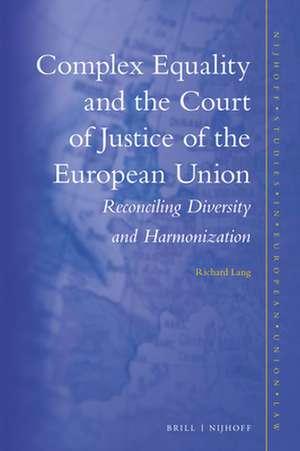Complex Equality and the Court of Justice of the European Union: Reconciling Diversity and Harmonization: Nijhoff Studies in European Union Law, cartea 14
Autor Richard Langen Limba Engleză Hardback – 18 iul 2018
Din seria Nijhoff Studies in European Union Law
- 18%
 Preț: 842.37 lei
Preț: 842.37 lei - 18%
 Preț: 871.64 lei
Preț: 871.64 lei - 18%
 Preț: 748.43 lei
Preț: 748.43 lei - 18%
 Preț: 812.98 lei
Preț: 812.98 lei - 18%
 Preț: 961.43 lei
Preț: 961.43 lei - 18%
 Preț: 971.32 lei
Preț: 971.32 lei - 18%
 Preț: 852.67 lei
Preț: 852.67 lei - 18%
 Preț: 763.07 lei
Preț: 763.07 lei - 18%
 Preț: 1185.56 lei
Preț: 1185.56 lei - 18%
 Preț: 832.90 lei
Preț: 832.90 lei - 18%
 Preț: 1056.89 lei
Preț: 1056.89 lei - 18%
 Preț: 963.09 lei
Preț: 963.09 lei - 18%
 Preț: 1035.95 lei
Preț: 1035.95 lei - 18%
 Preț: 712.67 lei
Preț: 712.67 lei - 18%
 Preț: 1028.77 lei
Preț: 1028.77 lei - 18%
 Preț: 857.62 lei
Preț: 857.62 lei - 18%
 Preț: 985.59 lei
Preț: 985.59 lei
Preț: 926.84 lei
Preț vechi: 1130.28 lei
-18% Nou
Puncte Express: 1390
Preț estimativ în valută:
177.37€ • 184.50$ • 146.43£
177.37€ • 184.50$ • 146.43£
Carte indisponibilă temporar
Doresc să fiu notificat când acest titlu va fi disponibil:
Se trimite...
Preluare comenzi: 021 569.72.76
Specificații
ISBN-13: 9789004299993
ISBN-10: 9004299998
Dimensiuni: 155 x 235 mm
Greutate: 0 kg
Editura: Brill
Colecția Brill | Nijhoff
Seria Nijhoff Studies in European Union Law
ISBN-10: 9004299998
Dimensiuni: 155 x 235 mm
Greutate: 0 kg
Editura: Brill
Colecția Brill | Nijhoff
Seria Nijhoff Studies in European Union Law
Cuprins
ForewordAcknowledgements1 Introduction1.1 Starting Point 1.2 The Trouble with Aristotle: A Précis 1.3 The Project in Outline 1.4 The Search to Find a Complement 1.4.1The Difficulty1.4.2Equality versus Freedom1.4.3Reasons for Choosing Walzer2 Michael Walzer and Complex Equality2.1 Introduction 2.2 Complex Equality: A Thumb- Nail Sketch 2.3 Negative Dominance 2.4 The Concept of ‘Shared Understandings’ Investigated Further 2.5 An Objection: Walzer’s ‘Relativism,’ and the Need for An Override 2.6 The CJEU and its Override: An Answer to the Objection3 The Principle of Equal Treatment of Persons Irrespective of Gender3.1 Introduction 3.2 Outline of Analysis and Taxonomy of Results 3.3 Characteristics and Voluntary Choices: Is the Theory Fit for Purpose? 3.4 Pregnancy 3.4.1The CJEU’s Case-Law3.4.2Preliminary Analysis3.4.3A Walzerian Analysis3.5 Paternity leave 3.5.1The CJEU’s Case-Law3.5.2A Walzerian Analysis3.6 Pensions 3.6.1The CJEU’s Case-Law3.6.2A Walzerian Analysis3.7 The Question of Part-Time and Full-Time Work 3.7.1The CJEU’s Case-Law3.7.2Preliminary Analysis3.7.3A Walzerian Analysis3.8 Positive Action 3.8.1The CJEU’s Case-Law3.8.2Preliminary Analysis3.8.3A Walzerian Analysis3.9 Insurance Premiums and Benefits 3.9.1The CJEU’s Case-Law3.9.2Preliminary Analysis3.9.3A Walzerian Analysis3.10 Concluding Thoughts4 Racial or Ethnic Origin, Religion or Belief, Disability, Age, and Sexual Orientation: New Statuses, New Status Rights?4.1 Introduction 4.2 Racial/Ethnic Origin 4.2.1The CJEU’s Case-Law4.2.2A Walzerian Analysis4.3 Religion and Belief 4.3.1The CJEU’s Case-Law4.3.2A Walzerian Analysis4.4 Age 4.4.1The CJEU’s Case-Law4.4.2A Walzerian Analysis4.5 Sexual Orientation 4.5.1The CJEU’s Case-Law4.5.2A Walzerian Analysis4.6 Disability 4.6.1The CJEU’s Case-Law4.6.2A Walzerian Analysis4.7 Concluding Thoughts5 Nationality Discrimination5.1 Introduction 5.2 Nationality Discrimination in EU Law 5.3 A Specific Example: The Free Movement of Persons 5.4 The Early Case-Law 5.5 A Walzerian Analysis 5.6 Cases Deriving from the Second World War 5.7 A Walzerian Analysis 5.8 The Citizenship Case-Law: Early Days 5.9 A Walzerian Analysis 5.10 The Citizenship Case-Law Evolves 5.11 A Walzerian Analysis 5.12 Interim Conclusion 5.13 The Citizenship Case-Law Since 2005 5.14 A Walzerian Analysis 5.15 Solidarity 5.15.1What is Transnational Solidarity?5.15.2Consideration and Responsibility5.15.3Asymmetric Solidarity, Pan-European Solidarity Publics and Walzer’s Position5.15.4Solidarity and Complex Equality5.16 Concluding Thoughts6 Semi-Suspect and Non-Suspect Grounds6.1 Introduction and Explanation of Terminology 6.2 Semi-Suspect Grounds 6.2.1Article 40(2) TFEU: Producers and Consumers6.2.2Article 106(1) TFEU: Public and Private Undertakings6.3 Non-Suspect Grounds 6.3.1General Introduction: Omega6.3.2Public Procurement6.3.3Human Resources6.3.4Competition Law6.4 Luck: Boundary Breach or Small Inequality? 6.5 Concluding Thoughts7 ReflectionsIntroduction Three Counter arguments 7.2.1The Need for Judicial Interventionism7.2.2The Possible Need for Expert Evidence, or Even Specialized Courts7.2.3The Need to Rewrite Legislation8 Presenting a Theory of Mediated Complexity8.1 Introduction 8.2 Further Consideration of the Forum, and Some Possible Problems 8.2.1The Design of the Forum8.2.2The Danger of the Forum8.2.3Interim Conclusion8.3 Mediated Complexity 8.4 The Judge vis-à-vis Society 8.5 Conclusion9 Evaluation9.1 The Two Methods Compared: Erpelding 9.2 Formulating the Argument 9.3 In Search of Flexibility 9.4 But Does Flexibility Lead to Uncertainty? 9.5 Judge Right Now 9.6 Postmodernism and Precedent 9.2.1Dworkin on Precedent, and A Critique9.2.2Postmodernism Challenges Neutrality And Positivism9.2.3Saying Yes to ‘We’9.7 Macro and Micro: The Equilibrium of Co- Existence 9.8 Complex Equality and European Union 9.9 Complex Equality for European Courts? 9.10 Parting Words: To Thine Own Self Be True10 ConclusionAppendix IBibliographyIndex
Notă biografică
Richard Lang, Ph.D. (2011), King’s College London, is Senior Lecturer at the University of Brighton and a solicitor. He has published articles on EU Law in several leading journals and has acted as Fundamental Rights Specialist for the European Parliament.
